
Nobody has ever measured, not even poets, how much the heart can hold.
—ZELDA FITZGERALD
I AM IMAGINING YOU IN YOUR CLEAN, LOVELY HOME WHERE, having just made and eaten a most delightful meal, you are satisfied and mindful and ready to read the final phase of this book: the one that focuses on the people around you. Who are the costars in the comedy-drama-romance of your life? Whose birthday is highlighted on your calendar? Whose names appear in your best stories? Who is your bridge over troubled water? Who is the wind beneath your wings? (Cue music… )
Your nearest and dearest are the ones who keep you grounded, who have your best interests at heart, who know you better than anyone. You need them, no matter what. And they’re the ones who will truly make your life worth relishing—so keep them close!
We’re living in the age of connection, but I hear a lot of people wishing they were more part of a community—locally, not globally. We have the ability to communicate with thousands of people with a few swipes of a finger, but we’re suffering from a curious kind of disconnection—because we’re going too big instead of focusing our attention on the people who really matter. Even if you have more Twitter followers than anyone else you know, it’s your real-life friends and family—the in-person, come-over-for-dinner, let’s-hang-out-on-weeknights-and-weekends kind of people—who create your emotional landscape. Even though our phones can give us definitions, translations, and directions, it’s the people we love who give us true (emotional) support and (personal) feedback.
Family are (or can be) the friends you’re born with—just like friends are the family you choose. Maybe you and your family are close as can be; maybe some of your relatives don’t fall squarely in the center of your relationship Venn diagram of perfect family and perfect friend, and that’s okay. As long as you know the difference between DNA and BFF, you’ll be able to better enjoy family gatherings and reframe the way you see your family dynamic. A sister may be sweet and generous, but she can also be your nemesis! A brother may be solid and supportive, or he might totally ignore you. If your siblings are jerks, don’t be fooled by their resemblance to you, and protect yourself. If they’re the coolest, sweetest, funniest people around, count yourself lucky and don’t take them for granted!
If you’re close with your parents, don’t abuse the privilege by treating them kindly only when it suits you. If you call your mom to update her on your life, make sure you ask about hers, too. And don’t stop calling just because you’ve suddenly had an uptick in the activity on your social calendar. Good family—family you take care of and who take care of you—will be the rock under your foundation if you invest in those relationships. Remember: They knew you when you were pooping in diapers, popping pimples as an ugly teenager, struggling to make friends in college, dating your first boyfriend—they know everything! And they probably have the pictures to prove it.
If you want your family relationships to work, you’ve got to put the work in. Time represents values. So make room in your life for what matters.
Participate in family holidays, birthdays, and reunions. If you have brothers and sisters, as kids you knew that they were always around. Even when you begged them to get lost. Then, one day, everything changes, and your sister is in school in California while your brother is in New York becoming an actor (by which he means bartender). Instead of bickering and playing all the livelong day, there are friendly phone calls and emails and not nearly enough hang time. And what about your uncle Bob, who taught you magic tricks when you were a kid and still sends you cards on your birthday? When is the last time you saw him?
Yes, I know you have deadlines to manage and limited time and money to spend, but in the meanwhile, tell your friends you’ll go dancing another time and book that ticket to Philly, or Tulsa, or Brooklyn so you can go to the family reunion. And wear the darn T-shirt.
Remember the good times. When I was a kid, we spent every Friday night driving an hour and a half from our home in New Jersey down to Philadelphia to visit my mother’s parents. My friends teased me for missing all the fun with them every weekend, but looking back, I wouldn’t trade those family weekends with my clan for all the slumber parties in the world. There were raucous game nights and plenty of family dinners. My grandmother’s house was where I learned to cook and ride ponies bareback. It was where we ran around outside and played in the stream and ate hoagie picnics, and then my siblings and I all piled on to the foot of my grandparents’ bed to watch Abbott and Costello movies until way past bedtime. Those visits grounded me and showed me that I was part of a community. Those weekends made it possible to develop a deep relationship with my grandparents and see them as role models. Who I am today was grown in those Philadelphia weekends. I count myself very lucky to have such a supportive family; not everyone feels the same way. There’s a reason the word family is so often offered along with an eye roll—because family can get too close and step on feelings and over boundaries. It’s so easy to get annoyed at the people you’re stuck with, or be extra harsh on them because you know you’re tied by blood, and it can be just as easy to overlook the good stuff. So think back. What are some great experiences you’ve had with your family? Channel those positive feelings the next time your little sister calls to say the dry cleaner couldn’t get the stain out of the designer dress you loaned her.

Photograph courtesy of Daphne Oz
Travel is better with family to share it! Here are the Oz siblings (aka Ozlings) wandering a new part of town. If I had to guess, we’re likely searching out our next meal….
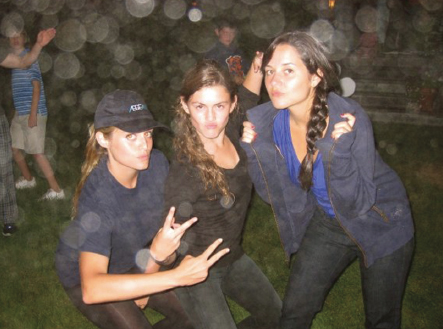
Photograph courtesy of Daphne Oz
You can run but you can’t hide from this gang! A team picture with my two sisters from an epic game of Oz family capture the flag: nighttime edition!
Forgive the not-so-great stuff. Dads who are too strict or are always at work or are threatening to marry their girlfriends. Moms who dress too young for their age, are obsessed with their yoga studio, ask too many questions. Brothers who flirt with your friends, sisters who make more money than you. And let’s not forget Cousin Ike, who swam in one Olympic tryout and still hasn’t stopped talking about it. Did Cousin Melinda tell everyone in your elementary school that you had a crush on Stevie Fisher? Get over it. They might be more suited to being characters in a science-fiction movie, but they’ve got your DNA (or they married it) and they aren’t going anywhere, so try to forgive them their trespasses, at least this once.
Dodge awkward questions. It can be scary to evaluate family relationships with a critical eye, because you can’t just break up with your parents or cousin or uncle without ramifications. Luckily, being stuck with people in your family doesn’t mean you have to get stuck in awkward conversations. The good news is that it is possible to love your family, be a supportive member of the clan, and still find a way to avoid the clutches of nosy Aunt Matilda.
We’ve all got an Aunt Matilda. When I was trying to find my career path, some of my relatives could not stop themselves from asking me indelicate questions about my “situation.” “What do you want to do?” “Have you figured it out yet?” They may have been trying to be helpful, but instead of inspiring me, it made me feel as if I wasn’t good enough because I was still working out the answers—and that wasn’t the kind of help I needed. I had plenty of self-doubt and anxiety all on my own, thanks.
If you’re feeling ambushed by relatives during a period of change, or fielding awkward questions about your desire to go back to school, quit drinking, lose weight, start a band, learn computer programming, end a relationship, date someone new, get married, have a baby, or the opposite—you’re happy where you are and others are clamoring for a change you’d rather avoid—stay strong. If you’re being pressed about sensitive subjects, take action. Be vocal. Unless someone’s truly evil, they’re just looking to connect with you, not give you high blood pressure. So give them a different way to connect: Ask them about their lives. Ask them about the weather. Or just steer them toward the hummus plate and go talk to somebody else.

Photograph courtesy of Daphne Oz
Me and my sister Arabella goofing around at the Grand Canyon on a family trip.
Don’t be afraid to change roles. We all have a part to play in the family drama, and when we go home we often regress to the role we were assigned when we were kids, whether it’s the bossy eldest, the annoying baby brother, or the über-responsible second mother. But you’re a grownup lady now, and your family deserves to get to know the mature, confident, settled woman you’ve become, so don’t be afraid to shift your role—and give others room to grow into their starring roles, too—meaning your baby sister doesn’t always have to take your word as gospel now that she’s got a baby of her own.
Friends are a different story all together. We collect them, choose them, keep them close, and sometimes have to let them go. They are the people we laugh with, the people we go dancing with, the people we can be goofballs with and never worry they’ll judge us. They’re the family we choose, and hopefully we choose them for life.
I don’t know what I would do without my best ladies and gents, and I never plan on finding out. Some I met forever ago, some I’ve met more recently, and all of them are an integral part of my life.
We learn from our friends, we talk issues out with them and we make personal decisions based on their feedback. In the best of worlds, they are people with characteristics you would be happy to emulate, people who draw out the qualities about yourself that you like best. Don’t underestimate how important loyalty, compassion, and sound advice can be. You’ll be happier in the long term if you choose wisely when you invite people into your inner circle. And being a good friend is a sure way to have good friends.
My mom always tells me to have standards, not expectations. The difference is that one sets what is acceptable for you and how you want to be treated; the other is demanding that someone act the way you want them to. We have no control over other people, so we might as well get used to not having expectations for them. Instead, surround yourself with people who consistently meet the standard of friend you want to be to them, who make you feel appreciated and happy. And make sure to appreciate them right back.
Show up—even if you’re running late. Being a good friend takes energy and effort. For a true friendship to evolve, for real closeness to develop, you have to be willing and ready to invest in your friend’s life and to let her invest in yours. To do that, you have to show up. Showing up ranges from dinner parties (we all remember those people who never emailed to let us know they couldn’t make it) to baby showers (that are more than an hour away in the middle of nowhere) to helping her pack up after divorce or move into a new home after marriage. We make friends with people when our paths cross. Later, as our paths diverge, it can become more confusing to navigate back to a feeling of closeness. Showing up means staying interested and in touch. Remember to think about them where they’re at, not where they used to be. If Susie just started nursing, no, she doesn’t want to do tequila shots with you at the club on Saturday night. And if Marguerite just got dumped, no, she doesn’t want to hear about your magical night of romance on Valentine’s Day. Being a friend means seeing what your friend is going through, not just projecting your situation—or who they used to be—onto them. And nobody wants a fair-weather friend. You have to be there to help her pick up the pieces just as eagerly as you were there to celebrate the good times.

Photograph courtesy of Brian Adams Photographics
This is one of my favorite pictures from our wedding. I loved getting to share this celebratory moment with some of my bridesmaids, barefoot and jumping in the grass like kids!
DASH
RANDOM ACTS OF REACHING OUT Every now and then, send your friends funny, random, or generous emails, voice messages, or even just texts. Congratulate them on a recent promotion or compliment a beautiful pic they posted. Remind them of that hilarious outing you had to Coney Island. Send a picture you stumbled upon in your photo library of the first night you went out all together and the ridiculous costumes you wore—you look so young! Include a link to an article that made you think of them—or just something that made you laugh.
My friends and I do this all the time, and it’s an easy and effective way to keep in touch even when we don’t have as much time as we would like to see each other. Everyone likes to know you think of them sometimes and that you know them well, and to be able to share common memories is always a great way to build on a solid friendship. Gandhi said we should be the change we wish to see in the world, so flood your inner circle with happiness, kindness, and fun—and change the world that feeds your soul!
Learn how to listen. Is it just me, or has everyone around us gotten extra snarky? It’s great to be clever and witty, but too many attempts at crafting the perfect punch line can make you miss the message. Your friends know that you’re really cool and fun and funny, but sometimes they don’t want a stand-up act: They just want you to be there. If you want close friendships, you have to be willing to have candid discussions. So pay attention. Listen. Share. Don’t sit there clicking on your phone. Stop checking your newsfeed. Be there fully. Being a friend is as much about listening as talking—maybe more.
That said, part of being a good listener is being a trustworthy audience. If someone shares something personal with you, put it in the vault. If you overhear a juicy piece of gossip, keep it to yourself. Keeping someone’s confidence is of the utmost importance. We all want to be seen as people with integrity who deserve our friends’ trust. If you damage that, it’s really hard to earn it back. And remember: A dog that brings a bone, carries a bone, so don’t expect any trust or discretion from your gossip buddies. Better to steer clear.
Know when to forgive. One of my best friends in the world lives abroad and is truly awful about keeping in touch, but because I know that about her, I don’t take it personally or feel insulted by it. If I really needed something from her, I know she’d be here in a heartbeat. Another of my best friends is superb about keeping in touch but often expects the same level of attention in return—and I don’t always meet her ideal, especially when it comes to remembering birthdays. Luckily for me, she’s come to understand that my forgetting her birthday is not because I don’t love and cherish her. It’s just one of my shortcomings, and one that she forgives.
Be honest—and kind. If a friend asks for your direct advice, you may tell the truth, but be gentle. Think productive, not mean. If you observe her doing something hugely stupid, out of character, or physically dangerous, you may tell her even if she has not asked for your opinion, but you must tell her nicely. Warning! Beware the moping trap. If you’ve got a friend who is constantly wondering if she should dump her (jerk of a) boyfriend or a brother who’s always complaining about his girlfriend, tread carefully. Should you unthinkingly offer back a casual “You’re so right, they suck,” odds are that a week later, they’ll be back together and you’ll be stuck with your stiletto in your mouth. The best advice I can give you is to ask questions and sympathize, because everybody needs to be heard. Chances are if you let them talk out the issue they’re facing, they’ll work through to the answer or solution they really want. People often just need a forum and a trusted pair of ears. Then again, if they’re always inviting you to a pity party, never an actual party, you might want to turn that kindness on yourself and cut loose. If Eeyore just wants to continue a twenty-four-hour whining loop despite your best advice—boring for you, not helpful for her—keep reading: There’s more below on distancing yourself from friendships that just aren’t working.
Offer to help. Childhood is full of droplets of wisdom that work just as well for adults, if we could just remember them. One great little droplet is this: Look for ways to help without being asked. People who need help are often too overwhelmed to know that they need help, or they’re too embarrassed—or overloaded—to ask. So pay attention to conversations with friends, and try to figure out what you can offer to do.
DASH
HOW TO TELL THE DIFFERENCE BETWEEN A CONFIDANT AND AN ACOUAINTANCE Don’t hesitate to draw distinctions between your social groups. A social acquaintance and, for that matter, an online “friend,” is not the same thing as a best friend. An acquaintance can certainly become a friend, but simply going out for a drink with someone does not make them a confidant. So don’t go running around telling everyone you meet about your messy breakup, no matter how many rounds of margaritas you’ve shared or how many of your Instagrams they’ve liked. Trust me, you do not want to spill all to the boss’s new assistant over French fries in the cafeteria, even if she’s buying, unless you want the CEO to know exactly what you do when you’re off the clock.
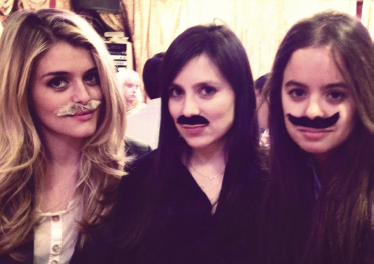
Photograph courtesy of Daphne Oz
CONFIDANTS
A confidant always calls you back.
A confidant comes to your birthday parties.
Your confidants know about your last breakup because they watched you bawl your face off.
A confidant tells you when they’re feeling sad, depressed, angry, or disappointed.
A confidant knows that you’re from Connecticut, that your parents are divorced, that you highlight your hair, and that you’re going to break up with your boyfriend at the end of the summer.
ACQUAINTANCES
An acquaintance is someone you’ve only ever emailed or texted.
An acquaintance leaves a “happy birthday” note on your wall.
An acquaintance only knows that your “relationship status” online has changed.
Online acquaintances tell you when they’ve been to a new restaurant and what they ate.
Acquaintances know that you’re from the Northeast.
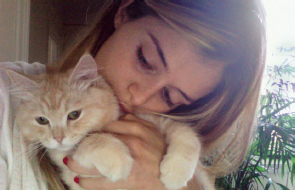
Photograph courtesy of Daphne Oz
This is me with my baby cat, Babycat, who is now more like four, but he’s the punk of all punks, and so he remains “baby.” When in doubt, turn to the four-legged for solid, unconditional, unwavering love and companionship—they can teach us a lot about how to love openly, ask for the affection we need, and return it!
If a friend who lives down the block has the flu, take her dog when you go running in the park. If a friend is bogged down at work, drop off a tray of lasagna or have dinner delivered. Yes, life is busy. And yes, the busier we are, the more work it takes to make room in our schedules for others. But if we want to be part of a loving community, we need to take action and create it by caring and doing, not by purchasing a membership card.
The Skinny on Friend Breakups
How do you know the people you think of as friends? Are they old friends whom you’ve known for years, who really knew you as the ugly duckling before the swan, the girls you went to soccer camp with? Are they newer friends who can better relate to you as you are right now, friends who have similar jobs or hobbies or live nearby? Or are they leftover friends, the ones you probably shouldn’t have in your life anymore but who manage to stick around by proximity, habit, or sheer persistence? The relationships you’re cultivating should offer depth as well as convenience, because we’re all affected by the people we keep company with.
Are your friends the kind of people who want to grow and evolve and who want to see you grow and evolve? Or are they the kind of people who like you best when you regress, falling back into bad habits you’ve worked hard to escape? Some people want you to stay the same so that they can stay the same. Others don’t understand why you’d want to change at all and resent the time you no longer have for them. Others may feel stuck in their own lives, and seeing your evolution may feel like a judgment on their own intransigent habits. The truest friends, the ones you should want to keep forever, are the friends who can support you wherever you want to go, whoever you want to become.
As you consider who your true friends are, the ones who really merit your attention and energy, consider how little time you have for yourself and the people who really matter the most. And then ask yourself why you would bother wasting another precious minute with someone who’s not doing it for you.
Crushes, Beaus, Live-ins, The One
Family is forever and friendship should be easy, but romantic relationships are where many people find bliss. They take work—and that’s not a bad thing! Cultivating a loving, trusting, supportive bond; uniting with someone, valuing them as your equal, and having them feel the same way about you; this is what we’re all looking for.
Maybe you want a marriage just like Mom and Dad’s; maybe the idea of marriage makes you cringe. Maybe you’ve had a ton of relationships; maybe you’re a serial lone wolf. Most people have to kiss a lot of toads before they find a prince, and making mistakes is okay (so long as you don’t know it’s a mistake when you’re making it—knowingly making bad choices leads to bad results).
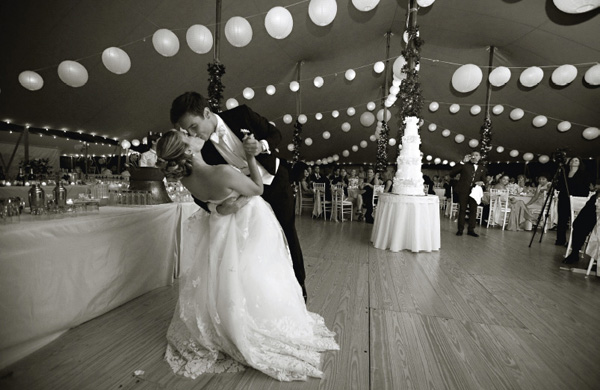
Photograph courtesy of Brian Adams Photographics
Our first dance after “I do!”
When you’re young, you might think you have time to spend with people you know you don’t have a future with. It can be fun for a while, something to pass the time. Or maybe you are convinced you’ve struck gold—and then things go south. Your twenties and thirties are about having the meaningful experiences that shape you, and you should have fun! But as you get to know yourself better, you’ll naturally want to preserve yourself more, treat yourself better, and let go of people and things that aren’t working. The more we focus on being true to ourselves and letting our best selves shine, the easier we will find it to shed bad habits (yes, people can be habits, too) and feel that their absence is a gift rather than a loss.
When it comes to growing up, the goal is to learn from our lapses of judgment so we can relish all the right moments that are to come. The main thing is not to waste time worrying that we’re not playing it right because, for now, the whole game is to learn by trial and error. The goal is to not wake up in twenty years and think: I don’t like who I’m with or I don’t know who I am, or I don’t like who I am, and I haven’t spent the time to really cultivate the person I want to be.
Invest now, play now, be honest, try new things now, and greet that future morning comfortable in your own skin and with a whole lot of life experience. The more full our own lives are, the more obvious it is that we’re not relying on someone else to give us our identity or purpose or happiness, the more people will want to be a part of our lives and create joy together. So let them! Put yourself out there unafraid and let them flock.
Whether you’re on your own, just starting something new, trying to take it to the next step, happily married, or working through a rough patch, start with you. What’s your goal? Where are you happiest? What can you do to make sure you’re heading toward this place? A more centered, complete you is the best place to start any loving relationship. And a more centered, complete you is what this book is all about!
Being Open to Loving Relationships
If you’ve found yourself somehow “undateable,” ask yourself whether you’ve been keeping your mind open to being in a loving relationship. So many of my friends who have either jumped from one bad relationship to the next, or can’t seem to find someone to spend their time with, are in one way or another sabotaging this chance at happiness. Whether it’s self-doubt that undermines your confidence, or the tendency to see fault first to protect yourself from feeling hurt later, the only person you’re denying is you.
Wake up to the fact that there is lots and lots and lots to love about you! Think about the things that you are attracted to: humor, kindness, and intelligence, interesting things to say and cool life experiences. Now think about how you do or do not emanate the things someone would find attractive about you. For starters, whether you’re skilled or still learning, you can cook, create a gorgeous home, and throw sensational parties all while investing in your long-term happiness—you’re a straight-up catch! Don’t let any little voice—even the one in your head—tell you otherwise.
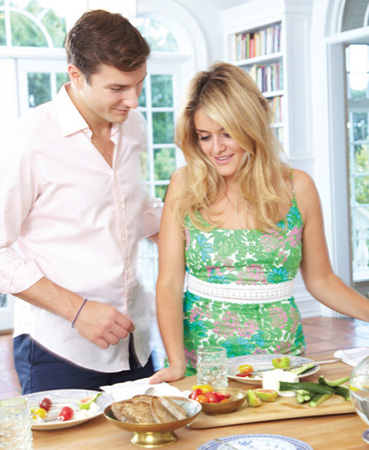
Photograph courtesy of Daphne Oz
Take the desperation away, take the anger and fear away, and instead start focusing on feeling complete just as you are. Radiate with self-love and confidence; glow with independence. Know that you are a whole person, with a whole lot to offer. An emotionally evolved, beautiful-inside-and-out kinda gal. I promise you, if you believe these things for yourself, it’s the most attractive thing you can do.
Making Good Relationships Great
Relationships need a whole lot of care and attention and effort—and it’s all worth it. I’ve been married for only three years, and I’ve already learned that while love feels like magic, being sprinkled with long-term pixie dust requires long-term investment and a healthy dose of fun.
Paying the mortgage and deciding who takes the trash out is part of a relationship, of course, but you can’t let responsibilities suck all the air out of the room. You and your partner fell for each other because you enjoyed spending time together, so make sure to keep a sense of play in the equation by planning date nights where you don’t talk about taxes, cozy mornings during which nobody does the dishes, and the occasional bout of teasing, tickling, and otherwise goofing around. If you can see each other as friends always, the rest is bound to be fun.
Here are some fail-proof ways to keep the romance alive and kicking happily ever after!
Remember that little things count big time. Getting flowers on my birthday is really nice. But when John brings me a bodega bouquet in the middle of July just because he thought of me and they were my color (blush pink!), that means the world. So show appreciation. Send sweet notes. Say thank you! Teach him how you want to be treated by treating him that way. What you do often is what you will do always, so practice like you play.
When you’re together, give each other your full, undivided attention. “We” time isn’t “Wii” time. Put the phone down. Hide your iPad. You can’t gaze lovingly into someone’s eyes if you’re reading emails and he’s checking the scores.
Fight well, with honesty and kindness. There’s no place for mean in a healthful relationship. Arguments are normal. Fighting dirty is unacceptable. If an issue needs to be worked out, put down the boxing gloves, pick up the box of tissues, and show him where it hurts—nicely. And then listen to him, hear out his injuries (do not belittle them), and do your best to fix them without feeling attacked. Take off the armor and approach the situation with compassion and an ear for understanding. It takes practice, but you will both be much happier if you can learn to fight nicely.
Learn to compromise. Being in a strong, loving relationship sometimes means doing things you don’t want to do (or at least that wouldn’t be your first choice), whether it’s eating at a restaurant you don’t love or choosing where to live based on someone else’s career or needs. There’s no formula to use, and sometimes it will feel like all the sacrifices are being made on your end (this is actually a psychological phenomenon—people always think they’re doing the most work in a group project). The trick is to remember that your partner’s happiness is as important as your own and that you should both be pursuing them equally. If your kindness and generosity are being taken advantage of, that’s something to talk about. But try not to keep tabs—love is not tit for tat.
Have your own lives. We want to be happy together, and so we learn to be happy apart. Happy couples work to find a balance between their independent lives and their lives together. Sometimes all I want is time alone with my husband. Other times, doing things solo is wonderful, because when we each have our own sense of happiness and fulfillment, we can share that with one another. Just because you’re partners doesn’t mean you have identical needs, wants, and likes. Having time apart gives you both a chance to fulfill those individual desires without feeling imposed on or resentful for being dragged along to the eightieth hockey game this year. Plus you’ll have great stuff to share when you meet up for dinner. As long as you keep teaching each other, feeding your passions and cultivating your own interests keeps the love alive!
Kicking Bad Relationships to the Curb
Plenty of us waste precious time in relationships that, if we are truthful with ourselves, we know aren’t right. We’re paralyzed by the fear that we won’t find anyone we’ll like as much, that we won’t know how to fill the gap, that we won’t know what to do on our own. We can tolerate all kinds of nonsense—from forgotten birthdays to forgotten phone numbers—under the misguided belief that “this is as good as it gets.” But you don’t know what you don’t know, and the longer you spend bound to someone who isn’t right, the longer you’ll be closed off to the possibility of meeting someone who is.
Here’s the truth: You have to demand the respect you deserve and remember that people will treat and see you how you treat and see yourself. So prioritize your needs, the things that make you feel stable and secure and fulfilled. But also remember that people only have as much control over your life as you give them. Unless they’re really worthy of the honor and the privilege, don’t give them access. More important, tell them to take a hike if they can’t treat you kindly, with respect, and with honesty at all times.
Relationships Teach You About You
Whether it’s family, friends, or the salt to your pepper, the funny thing about relationships is that they actually teach us much more about ourselves than about other people. Why do we need certain things from certain people? Why do certain things they do make us feel upset, undervalued, unloved? Why do we want to test them rather than give them the answer key and get straight to the good part?
The deeper you go emotionally with someone, the more you uncover not only about the way you like to exist in a relationship but also about the ways you need to grow as an individual.
The most intimate relationships we have bring up the issues outstanding in our lives that we need to work on, and we are (sometimes inexplicably) drawn to people who shine a light on those potential growth areas over and over again. Say you’re someone who’s always said you want to be taken care of and never have to worry, which is another way of saying never have to have responsibility. That may be your identity, but it may not. If you are meant to grow into the capable, self-reliant, independent person your subconscious knows you need to be, you’ll probably find yourself ending up in relationships with people who force you to stand on your own.
We can resist this growth, and often we do, choosing to look outward and see the things that cause us irritation and upset rather than looking inward and recognizing the opportunities for growth that these interactions are giving us. Plenty of relationships have ended because we refuse to be honest with ourselves and try to justify where and how we are (this is the “I’m right!” mode that traps us in the status quo) rather than seeing what might be missing. It is often easier to say “He is so needy!” rather than looking inward and seeing that potentially, his neediness was an opportunity for you to become more intimate, more emotionally developed because this was a gap in your life. The thing is that we will keep getting pushed to grow until we do. Our lessons might take different forms, but they’ll always be propelling us toward the higher self our subconscious wants us to become.
So learn the lesson already and get on being happy with all the wonderful people in your life by being happy, first and foremost, with you!
The most important relationships we have feed our lives in a way even the most perfect meal never could, so we should treasure them like gold. Below, I’ve pulled together my five favorite tips for maintaining happy, healthy relationships in all the areas of your life.
1. The best relationships are based on good health and bad memory.
2. Choose your attitude.
3. Remember the value of standards and the danger of expectations.
4. Set them up for success.
5. Never go to sleep angry.
Read on if you want all the juicy tidbits of how these tips will work for you!
Secret 1—The best relationships are based on good health and bad memory. First things first: Would you rather be right or happy? Now, think back on all the petty arguments that have ruined time together over practically nothing—were they worth it?
If the fight is only a short-lived outburst where you say things you don’t mean, it probably doesn’t need to happen. If it’s the kind that is long, festering, and sticks in your craw days and weeks later, then it needs a long-term solution, not the short-term relief that venting affords. I am all about airing grievances and speaking my mind, but it has to be solution-oriented. Holding grudges, as tempting as it is, hurts you more than anyone else by bottling up the negative energy and souring you from the inside out—like a pickle!
On the flip side, recalibration and reconnection can happen in an instant. Being kind, and supplying emotional and physical nourishment (help keep each other healthy from the inside out!) brings you together and drives away bitterness, resentment, and hurt. We all need to be heard, and we all want to be with someone who makes us feel safe enough to share exactly what makes us tick and what makes us boil. So take a walk together or set the table for two and hash it out, keeping the affection you feel for each other front and center. Take what you can learn and forget the rest. You’ll both feel better afterward.
Secret 2—Choose your attitude. This one comes from my grandmother and sums up her personality in a nutshell. She’s a firm believer in the idea that you can only control your own attitude—and that attitude is key to how you feel: If you think you feel good, you start to feel good! Likewise, if you tell yourself you’re tired or old or mediocre at life, you will start to be all those things. We were never allowed to say “I’m bored” under her roof. Her response: “Only boring people get bored.”
Think about it this way: Part of creating a life worth relishing is making a commitment to focus only on things that make your life better and more full somehow. When choosing your attitude, you’re deciding what your outlook on life will be. Habitually happy people are not that way because only good things happen to them. Instead, they simply decide that no matter what happens outside their control, their attitude will be a positive one. Their circumstances don’t change—but how they see those same circumstances does. Choosing to do the best you can with what you can control, and make the best of what you cannot, seems like good life advice all around.
Secret 3—Remember the value of standards and the danger of expectations. This is one of the most valuable things my mother ever taught me, and it follows perfectly from my grandmother’s tip above. When you focus on standards of your own rather than expectations for somebody else, you’re choosing an attitude of power—power to change your surroundings, power to change yourself, and power to pursue happiness rather than waiting for someone else to make you happy.
Standards define how you value yourself, and they are the bare minimum you require in order to be in a relationship—for instance, no cheating, no stealing, no lying. You control where these standards are set, and if someone is not able to meet them, then it’s simple: They don’t get to be part of your life. Compromising on your standards doesn’t do you or anyone else any favors—and it certainly won’t make you happy if even this lowered bar can’t be met.
Expectations are another thing entirely. These are little tests you give people to see if they will react how you want them to, whether it’s expecting your boyfriend to call five times a day or expecting your friend to cancel her plans because your calendar just opened up. Sometimes what you want and what the other person wants are aligned and you’ll be happy. Sometimes he will bend to your will, but he’ll probably resent you for it. And sometimes she will do what she wants instead and you’ll be disappointed.
Whenever you base your happiness on someone else’s behavior, the power is no longer in your hands because the choice isn’t yours to make. The only choice you do have is whether to adjust your expectations or not. Unlike standards, adjusting expectations does not in any way diminish you. In fact, it’s a worthwhile exercise to see how you can create positive change by focusing on your own behavior. In all likelihood, getting to the root of the issue will show you how little of what you expect of other people actually has to do with them and how much of it is really about things you need—and can probably give yourself.
If you would like to read more on this point, go straight to the source. My mom’s book on precisely this topic, and all matters of the happy heart, is called Us: Transforming Ourselves and the Relationships That Matter Most.
Secret 4—Set them up for success. No matter how close you are to someone, she can’t get it right all the time unless you tell her what you want—and even then, she’ll sometimes want to do things her way instead (shocking!) and you’ll just have to live with it, or not. Rather than testing her ability to guess, set her up for success by being clear and open about what you need: It’s much easier, and you’ll both be happier. And treat others the way you want to be treated—they’ll learn from you!
Secret 5—Never go to sleep angry. This little droplet of wisdom seems to be the most commonly held tenet of happy couples everywhere. I don’t know if there’s a biological reason why going to sleep angry is bad—other than it’s actually difficult to fall asleep if one is in a rage about something—but it always seems as if I wake up with renewed resentment. Like my subconscious solidified all the petty ways I knew I just had to be right and so-and-so was obviously in the wrong (this goes for partners, friends, coworkers, and the random dude who body-slammed you on the subway).
Let it go. If it really needs to be hashed out, reach someplace to pause and approach it again in the morning with a clear head. Going to sleep in the heat of an argument only fuels the fire of the fight. If it lingers over long periods, chances are you’re focusing more on getting a confession or proving someone wrong than you are on finding a solution.
And while you’re at it, everyone knows to pick battles, but I’ve found it even more important to pick your timing. It may seem like an opportune moment to bring up a contentious subject as your partner is sinking into his or her pillow after a long day at the office, but in all likelihood, the response will not be a desired one. Cranky people are seldom rational, and tired people are seldom forgiving. It won’t always be sunshine and rainbows, but learning to forgo the blowout fights as often as can be means less time cleaning up the mess and more time enjoying the party.
Now, who wants dessert?
